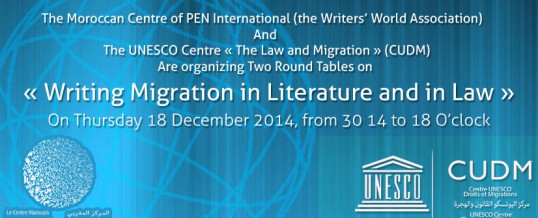
To commemorate the international migrants’ day
The Moroccan Centre of PEN International (the Writers’ World Association)
And
The UNESCO Centre « The Law and Migration » (CUDM)
Are organizing Two Round Tables on
« Writing Migration in Literature and in Law »
On Thursday 18 December 2014, from 14 30 to 18 O’clock
At
The National Library, Rabat, Kingdom of Morocco
Concept paper
To commemorate the international migrants’ day, The Moroccan members of PEN International (Association of writers) and the lawyers who are members of the UNESCO Centre « The Law and Migration » (CUDM) are organizing a scientific meeting on « Writing Migration in Literature and in Law » on Thursday 18 December 2014 from 14 30 to 18 O’clock at the National Library, Rabat, Kingdom of Morocco
Migration has always existed in all societies, but in the last twenty years, migration influxes have developed a lot, particularly in the South.
Both Literature and Law are disciplines which focus on humane and humanist questions and deal with migration issues. Thus, while the Literature informs about migration and migrants’ lives, the law regulates migration, reports on the different migration cases and defends all categories of migrants.
Morocco has always been a country of all kinds of migration. Its population is a « melting pot » of races and cultures. Many Moroccan family names inform on their migration origins. Since the 1990s, the international conjuncture has witnessed various arm conflicts, economic, political and environmental crises; this was followed by closing western borders for immigrants coming from the South and the introduction of changes in immigration movements towards Morocco.
For some years now, many Moroccan novels and other literary texts addressed the theme of emigration to Western countries. The « harragas » literature includes texts written in many languages by Moroccan authors. These pieces of literature written on migration take different forms: fictions, stories, reports, testimonials, etc. Some authors resort to aesthetic tools that are tainted with lyrism and magic realism as if to convey the fate of these nomads of modern times who are condemned to immobility.Despite its aesthetic, poetic or lyrical character, this literature is deeply rooted in the everyday news and seeks to restore the human dimension of this issue.
Besides, Migration Law, organizes population movements, sanctions irregular migration and protects migrants. This branch of law has especially developed since the enactment of the Charter of all migrants: the International Convention on the Protection of the Rights of All Migrant Workers and Members of their Families of 18 December 1990, a date which is celebrated worldwide as the day of all migrants. Since then, lawyers have invested this discipline.
Migration Law has developed in Morocco especially since 2000. It has developed particularly after the promulgation of the 2011 Constitution, the recommendations of the National Human Rights Council relating to the rights of foreigners in Morocco and the royal guidelines for a more humane and humanistic immigration policy in September 2013.
Until 2013, some foreign «guests” in Morocco were living as irregular migrants and without rights. Several writings concerned their poor social conditions, deplored some violations of their rights and put emphasis on the need to ensure a balance between state law that organizes migration and the law protecting migrants and called for the need to implement the national and international legal instruments relating to migrants’ rights. Referring to the human dimension of migration, some authors have called for more justice towards migrants
During this 18 December scientific meeting, two round tables will address the following topics:
- Round Table I: Writing Migration Law: status and recommendations
- Round Table II: Writing migration in Literature: between fiction and reality
“Writing migration in Literature and in Law”
On Thursday, December 18, 2014 from 14 30 to 18 O’clock
At the National Library, Rabat, Kingdom of Morocco
PROGRAMME
14 .30 – 14 .45 Opening
Roundtable I: Writing Migration in Law: Status and Recommendations
Moderator: Mrs. Khadija Elmadmad (Law Professor, Advocate and Director of the UNESCO Centre « The Law and Migration” )
14.45 – 15. 00 Mme Sylvie Sarolea (Law Professor at Louvain La Neuve University in Belgium and Advocate at Brussels Bar Association )
15.00 – 15.15 Mr. Younes Arbaoui (Lecturer at the University of Amsterdam in the Netherlands)
15.15 – 15.30 Researchers in Migration Law under the supervision of Professor Fatima Meslohi (Studies and Research Unit on “Migration and Human Rights”, University Hassan I, Settat)
15.30 – 16.00 Discussion
16.00 – 16.15 Break
Roundtable II: Writing migration in literature: Between Fiction and Reality
Moderator: Ms. Aicha Belarbi (University Professor and Expert on migration studies)
16.15 – 16.30 Khalid Zekri (University Professor, Writer and Critic)
16-30 -16.45 Mohammed Amansour (University Professor and Writer)
16.45 – 17.00 Mr. Youssouf Amine Elalamy (University Professor and Writer)
17.00 – 17.30 Discussion
17.30 -17.45 Closing
Steering Committee
– Youssouf Amine ELALAMY
Writer, Professor of literature and communication
President of the Moroccan Centre of PEN International
Phone: 212 6 61 40 11 02
Email: elalamy@gmail.com
– Khadija Elmadmad
Advocate and Professor of Law
Director of the UNESCO Centre “The Law and Migration” (CUDM)
Phone: 212 6 68 89 60 00 // 6 61 31 10 42
Email: khadijaelmadmad@yahoo.fr contact@cudm.net
– Mohamed Jawad IDRISSI QAITONI
Advocate and former Liaison Magistrate
Member of the Board of the UNESCO Centre “The Law and Migration” (CUDM)
Tel: 212 6 61 81 56 24
Email: Jaouad.idrissiqaitoni@gmail.com
– Fouzia Rhissassi
Professor of Literature
Former Dean of the Faculty of Letters in Kenitra
Secretary General of the Moroccan Centre of PEN International
Tel: 212 6 61 22 90 23
Email: f.rhissassi@gmx.fr
Share